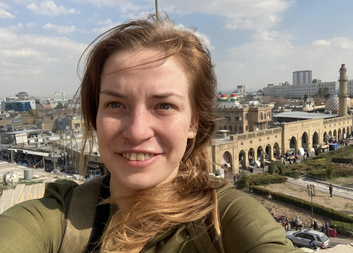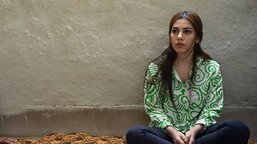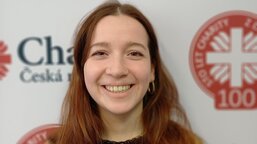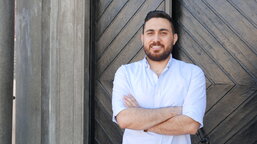Would you like to know more about the Humanitarian Aid and Development Cooperation department in Caritas Czech Republic? We launched a series of interviews with our colleagues, who will tell you more about our work across the world. This time we interviewed Anna Čaňová, our finance coordinator for the Middle East.
When did you start working for Caritas Czech Republic, and why did you decide to work in the non-profit sector?
I started working for Caritas Czech Republic in April 2022, so I have been here a little over a year and a half. I have always wanted to work in the non-profit sector. I wanted to help people in need. I appreciate the informal environment and how friendly my colleagues are.
You are working as a finance coordinator for the Middle East. Can you tell us what your job consists of?
I am a liaison between our headquarters in Prague and our offices in Iraq and Syria, Turkey, respectively, because we manage our activities in northwest Syria from here. My responsibility is to ensure everything regarding our finances is done according to the rules of our donor institutions.
What do you enjoy most about working at Caritas Czech Republic?
It is not just one thing. I appreciate the flexibility, the diversity and the friendly team. I worked for a long time in different countries in the Middle East and would hate to give up that world. But working in the field for a long time is mentally demanding. It is a very stressful job. I had my backpack packed all the time and had to be alert in case something happened.
As a financial coordinator in Prague, I have a much calmer working environment, but I am in daily contact with colleagues from Iraq and Syria. The region is really close to my heart, so I am glad I have the opportunity to go back there for business trips. At the same time, I know I will return to Prague, where life is comfortable, which makes me realise I have much to be thankful for here. Working at Caritas Czech Republic allows me to have both worlds. To work from the comfort of my home whilst doing work that fulfils me in a region close to my heart.
What is it about the Middle East that fascinates you so much?
I wanted to work in Africa at the beginning of my career, but I ended up in Palestine, where I spent two months on an observation mission. I found out how friendly and hospitable the local people are. I also lived in Lebanon, where I worked for an Italian humanitarian organisation. Lebanon, in particular, or even Syria, were rich countries, but within a short period, the situation for the people here had deteriorated significantly. Something similar could happen to me, so I easily identify with them.
This region is close to me not only personally but also professionally. When I started at Caritas Czech Republic, most of our activities were focused on humanitarian aid. As a financial coordinator, these projects are challenging; they change very often, and we usually have to adapt them to the needs of the people we help. So, it is more creative than projects focusing on development cooperation, written for several years. But we reflect the needs of the people, so our work is also now moving towards longer-term development activities.
You mentioned that our work in the Middle East is slowly transforming. How is Caritas Czech Republic helping people in this region today?
Until a year and a half ago, our projects in Iraq focused on humanitarian aid, such as providing decent housing and building sanitation facilities for people displaced by the war. At the moment, we are helping people to be self-sufficient so those returning home after the war or have decided to stay have a way to support themselves.
We also help locals to fight climate change. Iraq is largely a desert, one of the countries that suffers the most from climate change. That is why we show farmers modern farming methods, allowing them to harvest several crops yearly, even under challenging conditions.
In the Turkish-Syrian border region, we provide humanitarian aid for people affected by the earthquake. We provide them with food, safe shelters and sanitation facilities. Regarding our activities, the Middle East is diverse, so I greatly enjoy the work.
You mentioned the obstacles you faced during your time in Palestine and Lebanon. Are you facing any challenges now?
Sometimes, the distance between Prague and my colleagues in the Middle East can be a problem. After all, it is better to meet colleagues in person occasionally. That is what business trips are for; they allow us to build closer relationships and make it easier to work.
It is also important to remember that the Middle East has a different culture and customs that must be respected in the work environment. For me, it is easier because I've gotten used to it over the years.
You talked about the possibility of visiting our offices thanks to business trips. Have you seen our offices abroad?
Yes, I have mainly travelled to Iraq because I first took over the Finance Manager position and then trained new colleagues. I have also been to our partner organisation, Violet, in the Turkish province of Hatay, where we manage our activities in northwestern Syria. This was just before the earthquake hit the area.
But it is not as if I have visited our offices regularly. My business trips are based on some pressing financial matters. If there is no need, I do not travel there because every trip costs something.
What does your typical working day look like?
I get to work at 8 AM at the latest and usually have breakfast in the office because I am not hungry right after waking up. There is a slight time difference between me and my colleagues in Iraq and Syria, so we usually meet first thing in the morning. But every day is different. In the Middle East, they do not work on Fridays; instead, they work on Sundays, so I have more time to catch up on what I missed during the week.
What are you most proud of in your work?
I am proud that we are helping people in need. And we can do this thanks to good relationships with the locals because we can only do it with their know-how.
The situation in the Czech Republic is also challenging for many groups. Even so, people, including pensioners and single mothers, are helping others. In the spring, a pensioner stopped by our Prague office to give money to support people affected by the earthquakes in Syria and Turkey. She does not have online banking, so she brought the cash in person. That made me very happy.
What do you do when you are not at work? What are your hobbies?
I like to spend time in nature. I want to disappear into the woods and sleep outside. I love hiking, and I also like to go trampolining in Prague.
Are you interested in an internship or work at Caritas Czech Republic? Join us!
JOB OPPORTUNITIES AND INTERNSHIPS












